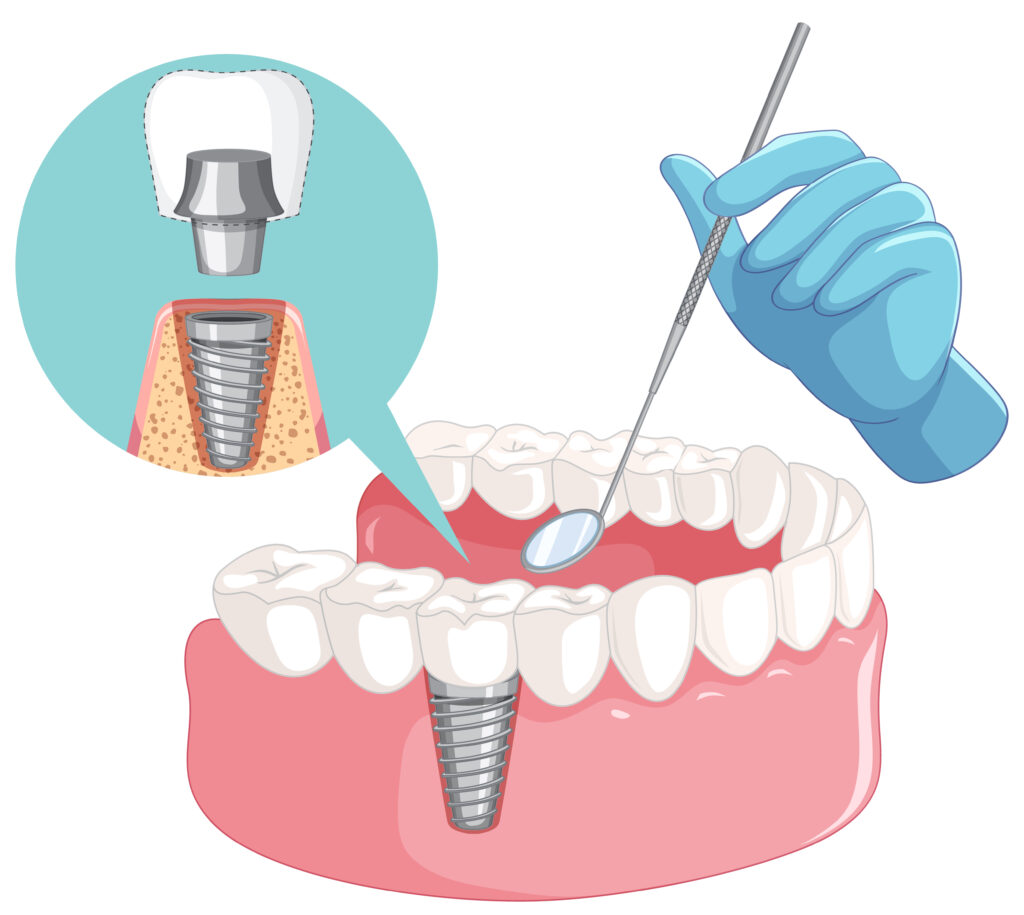Dental implants have revolutionized modern dentistry, offering a permanent and natural-looking solution for missing teeth. However, one of the most common questions patients ask is, “How long does a dental implant take from start to finish?”. The answer isn’t one-size-fits-all, as the duration can vary based on individual cases. This blog will guide you through the entire dental implant process, from initial consultation to full recovery.
What Is a Dental Implant?
A dental implant is a titanium post that is surgically inserted into the jawbone to act as a replacement root for a missing tooth. It serves as a strong foundation for a dental crown, bridge, or denture, offering both functionality and aesthetics.
Factors That Influence the Duration of a Dental Implant Procedure
The total time for getting a dental implant varies depending on several factors:
- Overall Oral Health – Healthy gums and jawbone facilitate a quicker process.
- Bone Density – Insufficient bone density may require bone grafting, adding to the timeline.
- Healing Time – Healing times vary depending on individual health and age.
- Number of Implants – Single implants heal faster than multiple implants.
- Smoking or Medical Conditions – Conditions like diabetes or smoking can prolong the healing process.
What Foods Can You Eat with Dental Implants? A Complete Guide
Step 1: Initial Consultation (1-2 Weeks)
The dental implant journey begins with an initial consultation. During this visit, your dentist will:
- Examine your oral health.
- Take X-rays or 3D scans to assess bone density and gum health.
- Discuss your medical history.
- Provide a customized treatment plan.
After the consultation, if no additional procedures are required, the implant placement can be scheduled within 1-2 weeks.
Step 2: Tooth Extraction (If Needed) (2-3 Weeks)
If you have a damaged or decayed tooth that needs replacement, the dentist will extract it. Healing from an extraction generally takes about 2-3 weeks. However, in some cases, a dental implant can be placed immediately after extraction.
Step 3: Bone Grafting (If Required) (3-6 Months)
For patients with insufficient jawbone density, a bone graft may be necessary. The procedure involves placing bone material (from the patient, donor, or synthetic) into the jawbone to strengthen it. Healing from a bone graft typically takes 3 to 6 months before the implant can be placed.
Step 4: Dental Implant Placement (1-2 Hours)
The implant placement is a minor surgical procedure performed under local anesthesia. The dentist will:
- Make a small incision in the gum.
- Drill a small hole in the jawbone.
- Insert the titanium implant.
- Close the incision with stitches.
This procedure takes about 1-2 hours for a single implant.
Step 5: Osseointegration (3-6 Months)
The most critical part of the dental implant process is osseointegration. This is when the implant fuses with the jawbone, creating a stable foundation. This process takes approximately 3 to 6 months, depending on the individual’s healing ability.
During this time, patients are usually fitted with a temporary crown to maintain aesthetics and function.
Step 6: Abutment Placement (2-3 Weeks)
Once osseointegration is complete, the dentist will attach an abutment to the implant. The abutment acts as a connector between the implant and the dental crown. This procedure involves:
- Reopening the gum to expose the implant.
- Attaching the abutment.
- Allowing the gums to heal for 2-3 weeks.
Step 7: Placing the Permanent Crown (1-2 Weeks)
After the gums heal around the abutment, a permanent dental crown is custom-made to match your natural teeth. This process takes about 1-2 weeks. Once the crown is ready, it is securely placed onto the abutment.
Total Estimated Time for a Dental Implant
| Step | Estimated Time |
| Initial Consultation | 1-2 weeks |
| Tooth Extraction (if needed) | 2-3 weeks |
| Bone Grafting (if needed) | 3-6 months |
| Implant Placement | 1-2 hours |
| Osseointegration | 3-6 months |
| Abutment Placement | 2-3 weeks |
| Permanent Crown Placement | 1-2 weeks |
The total time for a dental implant can range from 4-6 months for straightforward cases to 8-12 months if bone grafting is necessary.
Post-Procedure Care for Faster Healing
To ensure smooth and quick recovery, follow these post-care tips:
- Avoid hard foods for a few days.
- Maintain oral hygiene with gentle brushing and flossing.
- Attend follow-up appointments for regular check-ups.
- Avoid smoking or alcohol, which can delay healing.
Is a Dental Implant Worth the Wait?
Absolutely! Although the process can seem lengthy, dental implants offer lifelong benefits such as:
- Improved appearance and self-confidence.
- Enhanced chewing and speaking ability.
- Prevention of jawbone deterioration.
- Long-lasting results.
Conclusion
The duration of a dental implant procedure can vary based on individual circumstances, but the end result is always worth it. Understanding each step of the process helps you prepare for a successful dental implant journey. If you’re considering dental implants, consult with a qualified dentist to create a personalized treatment plan and restore your smile confidently.

